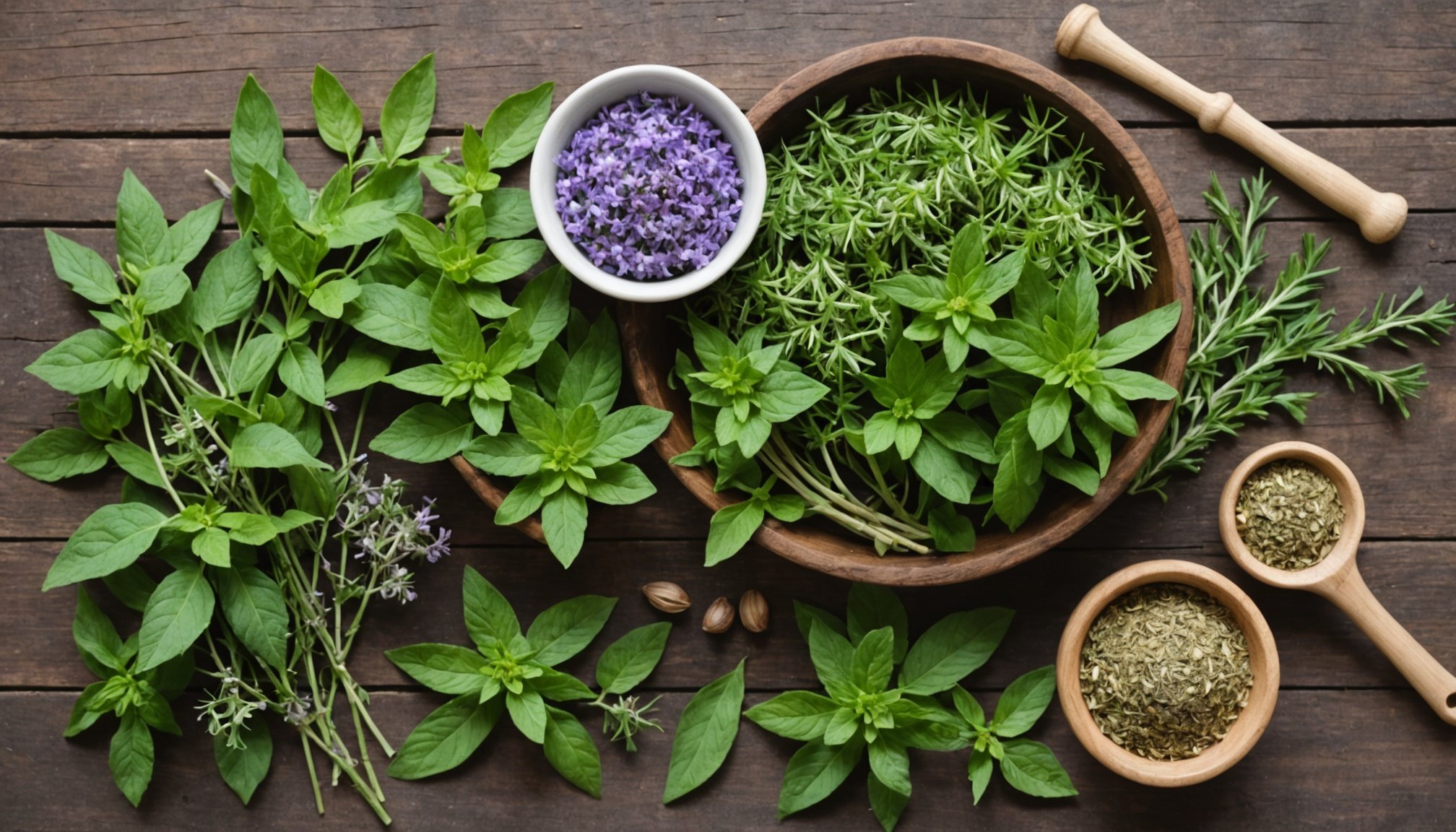Mastering Menopause: Harnessing Herbal Remedies to Tame Hormonal Fluctuations Naturally
Understanding Menopause: The Biological and Emotional Journey
Menopause is a significant life transition that every woman will experience, marked by a series of hormonal changes that can impact both physical and emotional well-being. It is a natural part of life, but the symptoms can be challenging to navigate. To truly understand menopause, it’s crucial to delve into the biology behind it.
Menopause occurs when the ovaries stop producing eggs, leading to a decline in estrogen levels. This decline triggers a range of symptoms, including hot flashes, night sweats, mood swings, and changes in sleep patterns. The perimenopause phase, which precedes menopause, can last several years and is characterized by irregular menstrual cycles and fluctuating hormone levels.
Also read : Unlocking the Secrets: Selecting the Perfect Eyebrow Shape to Flatter Your Facial Features
The Role of Herbal Remedies in Menopause
Herbal remedies have been used for centuries to alleviate various health issues, and menopause is no exception. These natural treatments can offer a holistic approach to managing menopausal symptoms, often with fewer side effects compared to conventional medications.
Herbs for Symptom Relief
Several herbs have been researched for their potential in relieving menopausal symptoms:
Also to see : Choosing the Perfect Eyewear: Tailoring Frames to Your Face Shape and Lifestyle
- Black Cohosh: Known for its ability to reduce hot flashes and night sweats, Black Cohosh is one of the most commonly used herbs for menopause. Studies have shown that it can significantly improve the quality of life for women experiencing these symptoms.
- Red Clover: This herb is rich in isoflavones, which are plant-based estrogens that can help balance hormonal levels. Red Clover has been shown to reduce the frequency and severity of hot flashes.
- Angelica: Often used in traditional Chinese medicine, Angelica has been found to improve mood and energy levels, which can be particularly beneficial during menopause.
- Evening Primrose Oil: This oil is rich in gamma-linolenic acid (GLA), an omega-6 fatty acid that can help with mood swings and other emotional changes associated with menopause.
How to Incorporate Herbal Remedies into Your Routine
Incorporating herbal remedies into your daily routine can be straightforward and beneficial. Here are some practical ways to do so:
Herbal Teas
Herbal teas are a gentle and effective way to consume these herbs. For example, you can create a blend using Black Cohosh, Red Clover, and Angelica. These teas can be consumed hot or cold, depending on your preference.
Supplements
Herbal supplements are available in various forms, including capsules and tablets. However, it’s essential to consult with a healthcare professional before starting any new supplement regimen to ensure it is safe and suitable for your specific needs.
Topical Creams
Topical creams like Wild Yam Cream, which includes ingredients such as Wild Yam, Red Clover, and Black Cohosh, can be applied directly to the skin. These creams are designed to be absorbed quickly and can provide localized relief from symptoms like hot flashes and night sweats.
A Balanced Approach: Combining Herbal Remedies with Lifestyle Changes
While herbal remedies can be highly effective, they work best when combined with other lifestyle changes. Here are some key areas to focus on:
Nutrition
Eating a balanced diet rich in whole foods is crucial. Avoid processed foods and opt for foods that are high in fiber, vitamins, and minerals. A diet that includes plenty of fruits, vegetables, whole grains, and lean proteins can help support hormonal balance.
Exercise and Recovery
Regular exercise, including both resistance training and aerobic activities, can help manage menopausal symptoms. It’s also important to prioritize recovery and ensure you get adequate sleep. Exercise can help reduce stress, improve mood, and support overall health.
Stress Management
Stress can exacerbate menopausal symptoms. Techniques like meditation, yoga, and deep breathing exercises can help manage stress levels. Additionally, engaging in activities that bring joy and relaxation, such as reading or spending time in nature, can be very beneficial.
Real-Life Examples and Anecdotes
To illustrate the effectiveness of herbal remedies and lifestyle changes, let’s look at a few real-life examples:
- Victoria Faulkner’s Story: Victoria, who was diagnosed with type 1 diabetes in childhood, managed her menopause symptoms while also dealing with diabetes. She emphasized the importance of tracking symptoms using a body map and advocating for continuous glucose monitoring. She also found herbal teas and dietary changes to be helpful in managing her symptoms.
- Dr. Louise Newson’s Advice: Dr. Louise Newson, a menopause specialist, often advises women to take a holistic approach to menopause. She recommends understanding the difference between synthetic and body-identical hormones, being aware of the health benefits of Hormone Replacement Therapy (HRT), and the importance of shared decision-making with healthcare professionals.
Practical Insights and Actionable Advice
Here are some practical tips and actionable advice for mastering menopause with herbal remedies:
Educate Yourself
- Read and Research: Educate yourself about menopause and the various treatment options available. Books like “The Great Menopause Myth” by Kristin Johnson and Maria Claps can provide valuable insights and practical advice.
- Understand Your Symptoms: Keep a symptom journal to track your symptoms and identify patterns. This can help you and your healthcare provider make informed decisions about your treatment.
Consult Professionals
- Healthcare Providers: Always consult with your healthcare provider before starting any new herbal remedy or supplement. They can provide personalized advice based on your health history and current medications.
- Holistic Practitioners: Consider consulting with holistic practitioners who specialize in menopause care. They can offer a more integrated approach to managing symptoms.
Stay Connected
- Support Groups: Joining support groups or online communities can provide emotional support and practical advice from women who are going through similar experiences.
- Family and Friends: Keep your family and friends informed about your symptoms and needs. Their support can be invaluable during this transition.
Table: Comparing Common Herbal Remedies for Menopause
| Herb | Primary Benefits | How to Use | Potential Side Effects |
|---|---|---|---|
| Black Cohosh | Reduces hot flashes and night sweats | Capsules, teas, or topical creams | Rarely causes side effects, but may interact with other medications |
| Red Clover | Balances hormonal levels, reduces hot flashes | Teas, supplements, or topical creams | May cause mild stomach upset or allergic reactions |
| Angelica | Improves mood and energy levels | Teas or supplements | May cause skin sensitivity or allergic reactions |
| Evening Primrose Oil | Helps with mood swings and emotional changes | Capsules or topical application | May cause mild stomach upset or interact with blood thinners |
Mastering menopause involves a multifaceted approach that includes herbal remedies, lifestyle changes, and a deep understanding of the biological and emotional changes occurring during this phase. By educating yourself, consulting with professionals, and incorporating natural remedies into your routine, you can better navigate the challenges of menopause.
As Dr. Louise Newson emphasizes, “Menopause can be the best time of your life if you approach it with the right mindset and support.” By harnessing the power of herbal remedies and making informed lifestyle choices, you can thrive during this significant life transition.
In the words of Kristin Johnson and Maria Claps, authors of “The Great Menopause Myth,” “Education, exercise, nourishing your body with the right foods, and managing stress are key to mastering menopause.” By combining these elements with the natural benefits of herbal remedies, you can create a holistic plan that supports your overall health and well-being.











